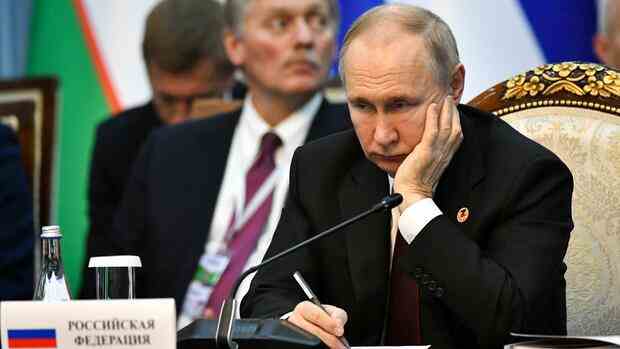Riga The sky is still dark and the welcoming committee at the airport is small when Russian head of state Vladimir Putin arrives in Kyrgyzstan’s capital, Bishkek. His counterpart and host Sadyr Dschaparow greeted him with a handshake.
The reason for the Kremlin chief’s visit to Central Asia is a summit meeting of the Eurasian Economic Union. In addition to Russia, the association also includes Kazakhstan, Kyrgyzstan, Belarus and Armenia.
The fact that Putin is arriving in person shows that he attaches some importance to the format. Central Asia is of particular importance to Putin at a time when Russia is looking for ways to mitigate the effects of Western sanctions.
The decisions of the meeting point to a simplification of trade conditions in some areas, but do not currently suggest a massive deepening of economic integration in the region.
According to the Kremlin, the politicians present signed documents on a total of 15 topics, including indirect taxes on electronic services, the list of “priority areas for the liberalization of services” for the internal market and the organization’s budget for the coming year – as well as one Decision to start negotiations with the United Arab Emirates to conclude a free trade agreement. The documents themselves have not yet been published.
The aim of the Eurasian Economic Union is the free movement of goods, services, capital and labour, as well as uniform policies in certain specified sectors – basically creating a common market similar to that of the EU. The reality is different, however, integration is progressing slowly and the power of the institution is limited.
Nevertheless, the economic union is important for Russia, as analysts at the British think tank Chatham House wrote in the summer, and above all geopolitically. However, the consequences of the Russian attack on Ukraine have made the organization “much more economically useful than ever before” for Russia – among other things because countries like Kazakhstan would make a significant contribution to Russia being able to circumvent sanctions.
Putin stated that the organization “has worked effectively this year and has consistently developed”. It was thus possible “not only to stabilize the macroeconomic situation in our countries, but also to improve a number of development indicators”. Putin pointed to the areas of unemployment, agricultural development and inflation.
But relations between Russia and Central Asia are fragile. Putin’s efforts are not entirely mutual: Russia’s war of aggression against Ukraine, constant threats to use nuclear weapons and, not least, Western sanctions mean that the Central Asian states are at a distance from previous times.
>> Read here: The relationship of Kazakhstan and Russia wobbles
They neither want to be exposed to Russia’s military power themselves – the threats against Kazakhstan in particular have increased this year – nor do they want to be lumped together more deeply than necessary by Western trading partners with Russia through violations of sanctions. Kazakhstan in particular had distanced itself from Moscow since the end of February. However, on Friday, Kazakh President Kassym-Jomart Tokayev said at the meeting that there was no question of Kazakhstan slowing down the integration process.
Uzbekistan’s President resigns
The fact that Uzbekistan’s President Shawkat Mirsiyoyev canceled his participation shortly before the summit could weigh more diplomatically for Moscow. Uzbekistan currently has observer state status within the Eurasian Economic Union.
In November, Russia proposed the creation of a so-called gas union between Russia, Kazakhstan and Uzbekistan to boost transit between the three states, but also with other buyers, including China. Uzbekistan’s Energy Minister Jorakeb Mirzamahmudov rejected the offer on Wednesday.
Armenia’s Prime Minister Pashinyan, Belarus’ President Lukashenko, Kazakh President Tokayev, Kyrgyzstan’s President Japarov and Russia’s President Putin.
(Photo: IMAGO/SNA)
He told Reuters news agency that “we will never agree to political terms in exchange for gas.” There are already negotiations on cooperation based on agreements with neighboring countries, said Mirzamahmudov, “not through an alliance or union”.
>> Read here: 30 billion barrels of oil reserves – Kazakhstan could become Europe’s new gas station
One of Putin’s advisors said that there would be an exchange on this topic in Bishkek. Uzbekistan, however, only sent Prime Minister Abdulla Aripov – a decision that can be interpreted diplomatically as an affront.
Alongside Kazakhstan, Uzbekistan is considered the second major power in Central Asia. The country has gradually distanced itself from Moscow since the start of the Ukraine war, albeit less obviously than neighboring Kazakhstan at first. Experts do not believe that a complete break with Russia, both politically and economically, is likely in any of the Central Asian states.
Bad news for the Kremlin ruler also came from India. The annual meeting between Putin and India’s Prime Minister Narendra Modi will not take place this year. This was confirmed by Kremlin spokesman Dimitri Peskov on Friday.
The Bloomberg news agency, citing an unnamed source, reported that the decision was related to Putin’s threat to use nuclear weapons in the war against Ukraine. However, the relationship between India and Russia remains strong.
More: Putin – Nuclear weapons are only for defense
